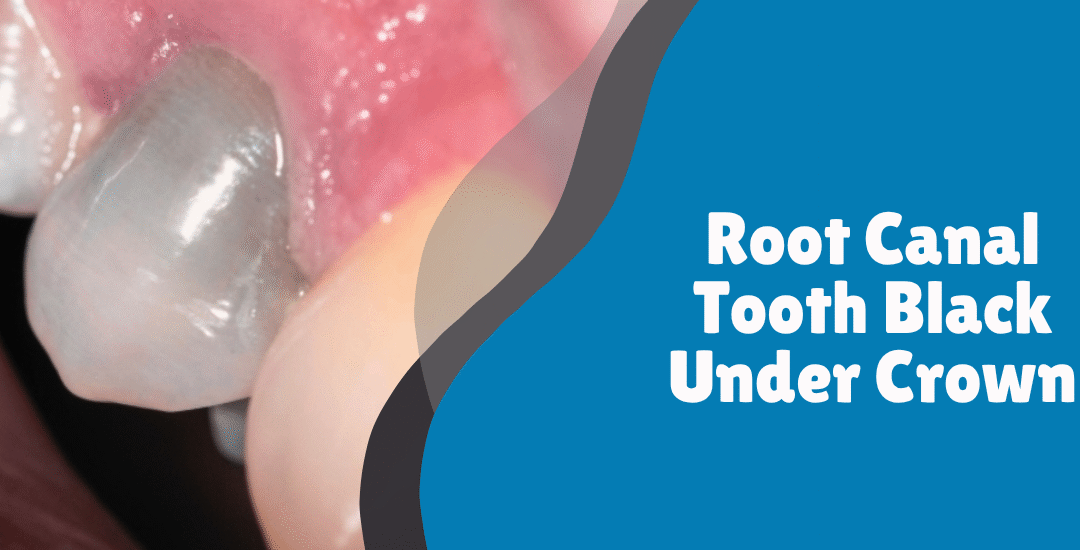Have you ever caught a glimpse of your reflection and thought, “Why does that tooth under my crown look darker than the rest?”
It’s a question many patients ask, and for good reason. A tooth that’s turning black beneath a crown after a root canal can feel unsettling. Sometimes it’s a simple matter of color change. Other times, it’s your tooth’s quiet way of asking for attention.
At Dr. Alisha’s Evershine Dental and Cosmetic Clinic in Chembur, we often say, “Teeth don’t speak in words, they show signs.” Our job is to interpret them. Using high-magnification loupes and digital X-rays, we determine whether the discoloration is a harmless shade shift or something that deserves immediate care.
Why Is My Tooth Turning Black Under the Crown
1. Internal dentin darkening After a root canal, the tooth no longer receives blood supply. Over time, the inner dentin — that strong yet porous layer beneath the enamel, may darken naturally. The color can sometimes show through, especially near the gumline. Think of it as the way old paper yellows with age; the structure remains, but the hue changes.
2. Crown material effects
The materials used in your crown play a big role. Metal-backed crowns or less translucent ceramics can give the illusion of darkness beneath. Even when perfectly placed, certain materials block light differently. A full-ceramic or zirconia crown can often restore the tooth’s natural brightness.
3. Microleakage or recurrent decay
This is the one we watch most carefully. Over time, tiny gaps can develop where the crown meets the tooth, a process known as microleakage. When bacteria sneak in, staining and decay follow. During evaluation, we inspect crown margins, cement seals, and bite contacts closely. According to a 2023 clinical review, nearly 15% of post-root-canal crowns show early signs of marginal leakage within five years if not regularly checked.
The takeaway? Not every dark tooth is infected — but every dark tooth deserves a closer look.
Is It Normal for Tooth to Turn Black After Root Canal

A gradual internal darkening over several years is fairly common.
A sharp black tint that appears suddenly, however, isn’t.
Color changes often depend on factors like crown material, seal integrity, and oral hygiene. When discoloration is paired with tenderness, odor, or food trapping, it may indicate bacterial entry. Some older crowns, especially those cemented without isolation techniques — are more prone to leakage.
So, while a black tooth under a crown doesn’t always spell trouble, it should never be dismissed. As the saying goes, “What we ignore today becomes tomorrow’s treatment.”
Does a Black Tooth Mean It’s Infected
The color itself isn’t proof of infection, but when combined with symptoms, it can be a strong clue.
Common signs include:
What to Do If Root Canal Tooth Turned Black Under Crown

Once we’ve diagnosed the cause, here’s how we usually approach it:
Internal bleaching if the tooth is healthy and sealed properly
Crown replacement using more translucent materials for natural aesthetics
Root canal retreatment when reinfection or missed canals are identified
Decay removal and post-core buildup if the foundation has weakened over time
When to Contact a Dentist
Schedule a visit if you notice:
Conclusion
A root canal tooth black under the crown may seem alarming, but in many cases, it’s manageable with timely evaluation. The reasons can range from natural dentin changes to crown material issues or bacterial leakage. What matters most is identifying which it is before the damage progresses.
At the Dental clinic in Chembur, we combine precise diagnostics with minimally invasive care to restore both function and appearance. Whether the solution involves internal bleaching, replacing the crown, or reinforcing the underlying structure, our focus remains the same — preserving your tooth and your confidence.
As the old dental adage goes, “The best crown is the one that protects without being noticed.”
Discoloration After Root Canal? Consult a Dentist in Chembur
Darkening of a tooth under a crown after root canal treatment may be due to internal staining, crown leakage, or underlying infection.
If you notice discoloration, visiting an experienced dentist in Chembur can help determine whether corrective treatment is required.

